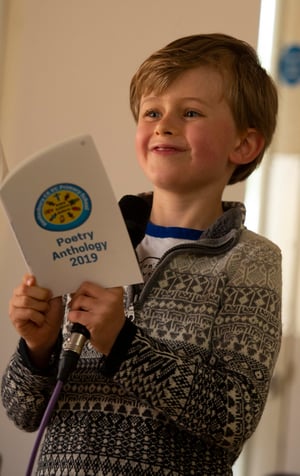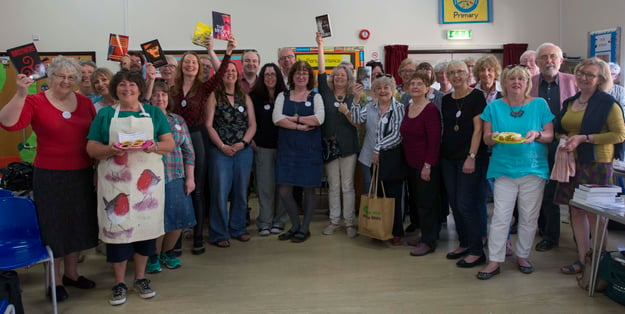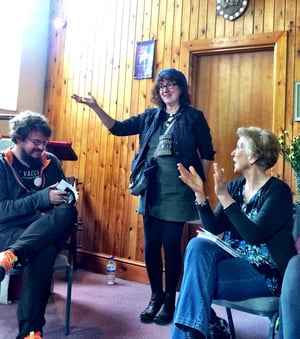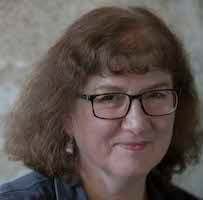With stiff competition for indies to get a place in the program of one of the big commercial literature festivals, it’s worth thinking laterally and going about it another way: by starting your own. Whereas the high-profile lit fests depend on famous-name, trade-published authors to sell the tickets that fund their year-round operation, there’s plenty of public appetite for small, friendly indie lit fests offering a different menu of speakers and the chance to meet their next favorite author that they’ve never heard of!
Your Festival, Your Rules
Running an indie lit fest also allows you to set your own rules.
Like to make it more accessible than elitist event ticket prices allow? Then make it all free.
Unless you’re lucky enough to have access to a free venue, you’ll need to find a way to fund it. Other unavoidable costs include public liability insurance, any costs associated with publicity (website URL, etc.), and print. Sponsorship is one means of funding an indie lit fest, or you might do fundraising events year-round, or set up a crowdfunding campaign.
If you can persuade your speakers to give their time for free, so much the better. Many indies will be happy to speak for free in order to add “as featured at (your lit fest)” to their writing CV. Provided you’re not asking authors to speak for free while charging people to see them, that’s not unethical. As Nicola Solomon, CEO of the Society of Authors, says—if you’re invited as an author to do something, go ahead as long as it satisfies at least one of the three Ps: profit, pleasure, publicity. If you can perm two of three at a lit fest, so much the better.
Want to focus on interesting topics rather than famous authors’ latest books that their publishers are keen to plug? Then set your programme to suit the mood of the moment.
With my own lit fest, I pick a topic that I think will draw an audience, and then pick the authors who I think are the best fit for it. These can be broad or narrow, depending on which willing authors have applied to be part of the line-up. Some of the sessions at the 2020 Hawkesbury Upton Literature Festival: "Historical Fact vs Historical Fiction" and "Spirit of Place in Fiction – Location and Dislocation," both of which had broad appeal.
Fancy a more democratic, hands-on experience for the audience? Then keep the event small and personal, and allow plenty of time for Q&A.
So, forget about a Green Room to protect writers from readers. You’ll be surprised how much more everyone enjoys themselves if they all mingle on an equal footing.
You can see in this photo (taken by Joanna Penn), that we're able to create a personal, intimate atmosphere for festival guests. In this session, ALLi News Editor Dan Holloway (on the left) chaired the poetry readings alongside prize-winning poet Shirley Wright (on the right).
One of my favorite compliments at the Hawkesbury Upton Lit Fest was when on leaving a lively panel discussion at which the audience said as much as the speakers, someone turned to me and said, with a satisfied expression, “You wouldn’t get that at Cheltenham Literature Festival!”
Authors also enjoy the opportunity to chat informally with potential readers. One young adult writer told me that for her, the high point of appearing at a previous HULF was spending half an hour talking to a small group of teenagers about what they like to read.
If this style of lit fest appeals to you, what are the main things to consider when organizing one of your own?
Venue
There are so many creative ways to find a venue! By venue, I don’t just mean the building but the local community.
 In this photo, Toby is reading the poetry book I published (via IngramSpark!) for the village school, where we held some of the festival events. We included a poem from every child in the school. (Photo by Angela Fitch).
In this photo, Toby is reading the poetry book I published (via IngramSpark!) for the village school, where we held some of the festival events. We included a poem from every child in the school. (Photo by Angela Fitch).
I live in a small but vibrant village in a part of the Cotswolds where people are generally friendly, welcoming, and supportive of new ventures. They welcome the occasions on which cultural and other events come to them to save them from trekking to the city. It’s much easier to make something like this work if you are well-connected locally. It would be a lot harder to create an event for which you need a decent-sized audience in a more urban setting, particularly if it’s the kind of place where people don’t readily mix with strangers or like to go out of their comfort zone.
Team
Although I started my festival on a very small scale with just me organizing it, you’ll enjoy it more and find it easier if you can share the workload with others—but not so many that you’re dependent on committee meetings and votes to make any progress. Just as with your self-publishing workload, identify the areas in which you lack skills and experience and delegate those to people who are the best match. At my festival, I now have a fabulous Young People’s director in the form of Kate Frost, who writes YA and adult novels. Running the festival bookshop is technical wiz David Penny, historical mystery writer, who sets up a database of stock beforehand, just like a real shop.
Publicity
Ideally, you need to have a comprehensive set of publicity tools, as for your books—a website as the central and definitive source of information online, social media accounts, and printed handouts. If you’re planning to make your festival an annual event, it’s worth building a mailing list and running a blog to maintain year-round interest and attract return visits by happy punters. But beware of creating a beast too big to sustain. This is another area that is easy to delegate (e.g., I had travel writer Jay Artale tweeting for us last year).
Don’t get too carried away and try to be all-singing, all-dancing in PR terms. Focus on the media that is the best match for your target audience. In a rural location like mine, a good piece in the parish magazine every month of the year is more appropriate and valuable (and much easier to achieve) than a few column centimeters in a big national daily.
Program
When drawing up your program, the most important thing to consider is who you want to attract. Do you want to attract only readers, or would you like to include items of interest to writers too? These needn’t be mutually exclusive. In HULF 2020, we have some workshops aimed at readers, such as "How to Find the Perfect Book," run by publisher Kate Macdonald, and some at writers, such as "The Writer’s Mindset" by award-winning author, editor, and writing coach Lorna Fergusson. And then we have some that will fascinate both, such as "Behind the Scenes at the Oxford English Dictionary," by the current editor and deputy editor, John Simpson and Edmund Weiner. 
If you already have a wide circle of author friends, you may well be able to put together a program without too much trouble. On the other hand, beware of devaluing the festival by allowing all and sundry a place or allowing people to assume that because they know you, they’re guaranteed a spot. I learned early on the value of a formal submissions process, where people apply online within a certain window of time. This makes the process more even-handed and objective and makes it easier to turn people away who are not a good fit for your program without hurting anyone’s feelings.
If you aren’t already connected with authors who might take part, seek out local authors’ groups and also national or international membership organizations such as the Alliance of Independent Authors.
Timing
Regarding the practicalities of the day, try to make it easy for visitors to plan their day and get to as many events as they can—and conversely, to deliver as large an audience as you can to your speakers. I went for the dead-simple approach: at my festival, which is one day only, but a very intensive day: every event starts on the hour every hour and lasts fifty minutes, allowing ten minutes turnaround for both speakers and audience.
I now have several strands of events running in parallel, all on one day—but you may prefer to spread out events over several days. This would make it less intense but also task you with bringing in a fresh audience each day. There are pros and cons to each approach. Either way, it’s best to start small and expand a little year on year as your confidence, team, and reputation grow. Mine began as an evening in a pub, and six years on, it’s still a one-day event but across multiple venues.
Ticket Sales
If admission is free to your festival, it’s probably not worth the hassle of “selling” tickets. Although it’s helpful to know numbers in advance, if someone has booked a free place for a ticket, they’re far less likely to turn up than if they’ve paid for it. If you are charging admission, unless you have a willing volunteer box office (your local high street bookshop, for example), it’s worth using a paid service such as Eventbrite to distribute tickets. You’ll pay a small fee for each ticket sold, but it will almost certainly be worth the hassle.
Book Sales
One of the great joys of going to a lit fest as a reader is the excuse to buy signed copies of books. No lit fest is complete without a bookstore (or a café—potentially an excellent money-spinner to help cover your festival costs). Most of the big lit fests team up with a major bookseller, which then runs the festival bookstore. You can play this two ways. Unless you are very lucky, a bookstore chain won’t be interested in running your festival book sales as it will be too small scale. But if you’d like a professional bookseller to be involved, this is a great opportunity to build relations with your friendly neighborhood indie store. Independent high street bookshops are usually keen to support community events, and their own profitability is shored up by getting themselves known in their local neighborhood. You could invite them to be your official festival bookseller, but it’s only fair and courteous to allow them the usual margin on every sale made.
But there is a third way that allows you and your authors to sell your books without a margin – and that is to organize a rota system of authors on the cash desk of your festival bookshop. Thanks to David Penny setting up a stock database beforehand, this was quite simple to administer, and, to my surprise, I had no shortage of authors volunteering to take a turn on the till. It seems all authors harbor a secret fantasy about being a bookseller and are happy to play shops on occasion! Also, being on the till proudly wearing your Festival author name badge means you have a good chance of persuading a customer to buy your books as well as the ones they’ve already picked from the shop!
Conclusions
Do not underestimate the workload of setting up and running your own lit fest. It will certainly give you a new appreciation of the organizers of bigger events! But go about it in a planned and sensible way, and you stand to gain huge rewards—not necessarily in terms of book sales (most people don’t buy a lot of books on the day but pick one or two)—but in terms of personal satisfaction for bringing joy and fulfillment to authors and readers alike.
For more information about Hawkesbury Upton Literature Festival, visit www.hulitfest.com. You’re also welcome to put any questions about running your own indie festival via the contact form on the site, which comes into my inbox.














